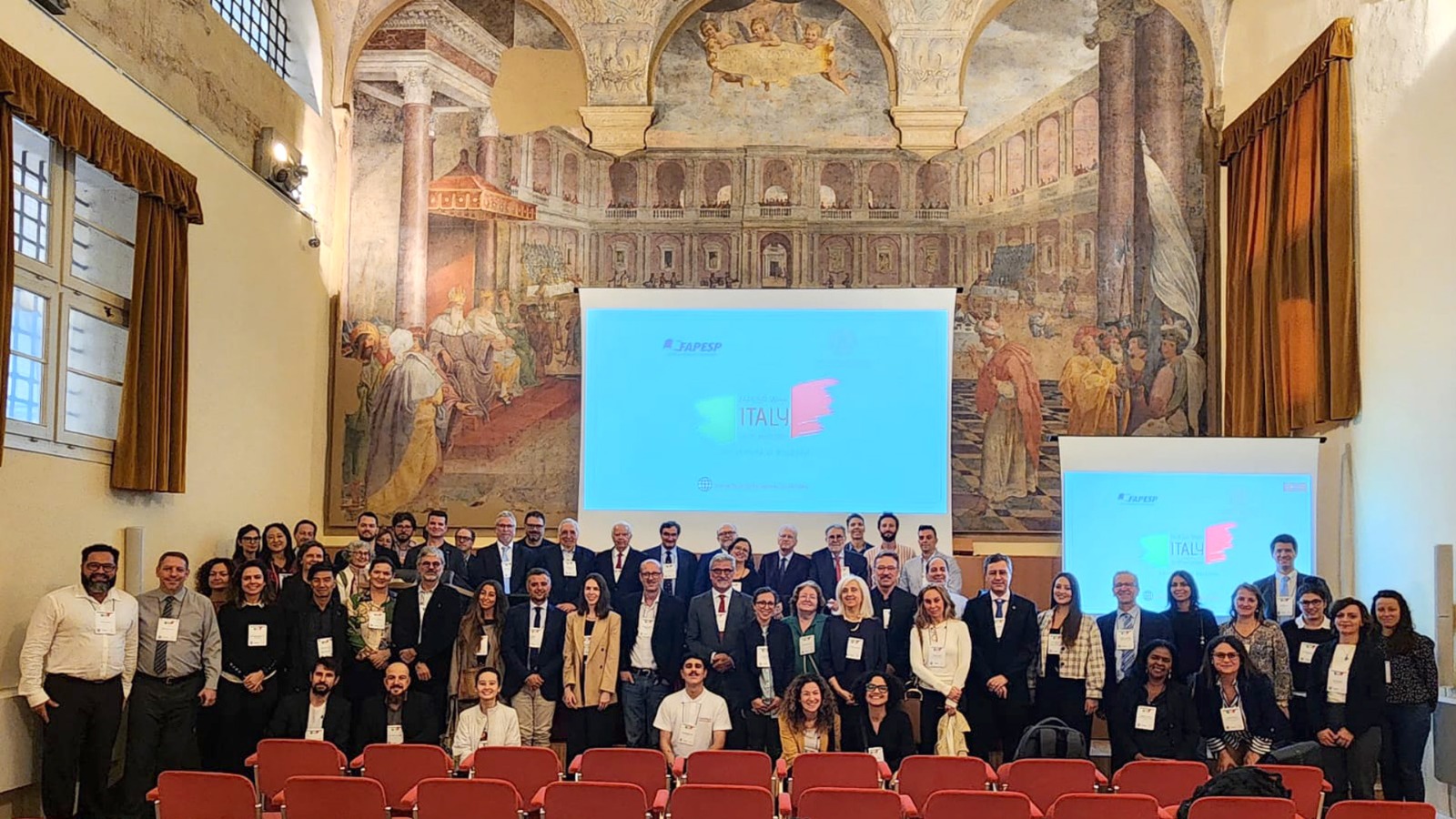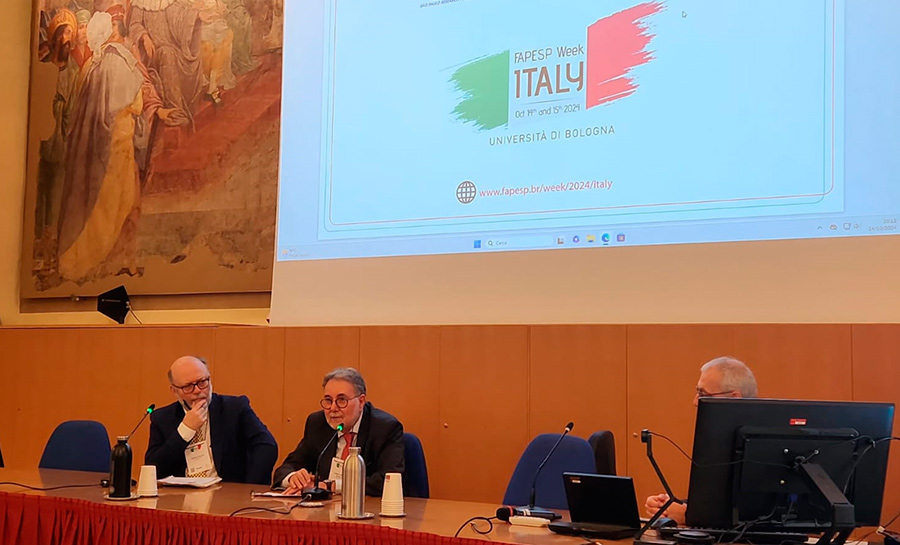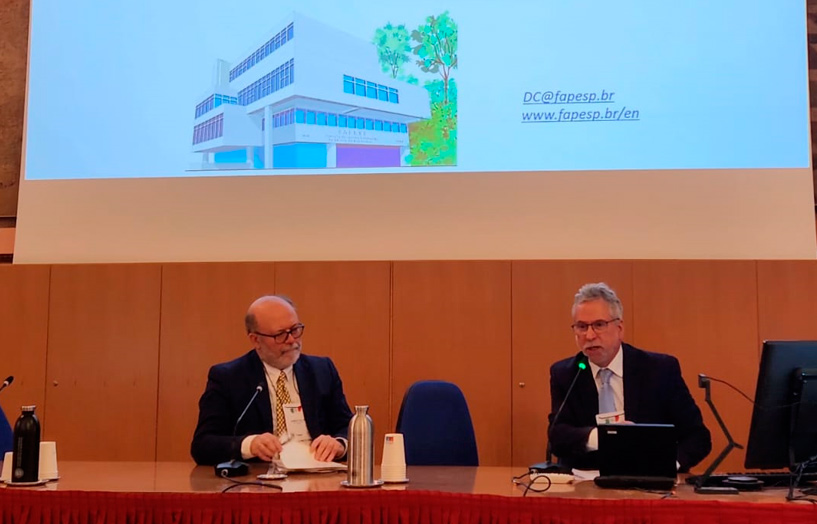

Around 70 academics from Brazil and Italy attended the opening ceremony of the 22nd edition of FAPESP Week (photo: Karina Toledo/Agência FAPESP)
Event aims to foster partnerships between São Paulo researchers and entrepreneurs and their Italian counterparts.
Event aims to foster partnerships between São Paulo researchers and entrepreneurs and their Italian counterparts.

Around 70 academics from Brazil and Italy attended the opening ceremony of the 22nd edition of FAPESP Week (photo: Karina Toledo/Agência FAPESP)
By Karina Toledo, from Bologna | Agência FAPESP – Around 70 academics from Brazil and Italy gathered in the city of Bologna on October 14 to attend the opening ceremony of the 22nd edition of FAPESP Week. Organized in partnership with the Alma Mater Studiorum - Università di Bologna (UNIBO), the event aims to foster partnerships between researchers and entrepreneurs from both countries.
“It’s a great pleasure to welcome you to our university for a new edition of FAPESP Week. UNIBO has built a solid relationship with Brazil that began more than 30 years ago with the creation of the Chair of Brazilian Literature. Since then, we’ve extended our academic collaboration to many scientific fields,” said Giovanni Molari, rector of Unibo, in his opening speech at the symposium.
Presenting the four thematic axes of the event – “Cultures, Inmaterial Heritage and Interdisciplinary Networks”; “Agri-food System and Sustainable Development”; “Health and Environment”; and “Technology and Innovation” – Molari explained that the panels were chosen in a fully collaborative way and represent areas of common interest to the institutions.
He said that through scientific collaboration and a shared vision, it will be possible to create a more sustainable, equitable and innovative future, making communities more resilient and robust. “We have to deal with incredible problems for different reasons, such as wars, the energy crisis, climate change. It’s important to work together because we can’t achieve the same goals alone,” he said.
Afterwards, the president of FAPESP, Marco Antonio Zago, recalled that the first edition of FAPESP Week in Italy takes place in the year that marks the 150th anniversary of the beginning of Italian immigration to Brazil. “In that great wave, my four grandparents emigrated to Brazil and I’m very proud to remember here the immense contribution of that period to the development of the state of São Paulo.”
He explained that the Foundation funds research in all areas of knowledge and presented the different types of support available, with emphasis on the Research, Innovation and Dissemination Centers (RIDCs), the Engineering Research Centers (ERCs), and the Innovative Research in Small Businesses Program (PIPE).
“All of our programs are open to international collaboration,” said Zago. “The science and technology system in the state of São Paulo is very complex. We’re responsible for more than 40% of Brazil’s scientific production. So this is a great opportunity to develop joint projects. We have a cooperation agreement with the CNR [Consiglio Nazionale delle Ricerche] and we can support collaborative projects between São Paulo researchers and any Italian institution,” he stressed.
Although the goal of the event is to strengthen collaboration between researchers from São Paulo and Italy, Zago reflected, the joint performance is already impressive. São Paulo accounts for 53% of all collaborations between Brazil and Italy.
“I hope that this meeting will be an opportunity for researchers and research groups to get to know each other better, not only during the formal presentations but also through informal exchanges,” he concluded.
Leader in innovation

Pacheco: “FAPESP wants to foster a strong relationship with the Italian academic community” (photo: Karina Toledo/Agência FAPESP)
The opening table was also attended by Gian Luca Baldoni, head of Internationalization of the Productive System of the Emilia Romagna Region, which includes 4.5 million inhabitants, 400,000 companies, 42,000 industries – including iconic names such as Ferrari, Ducati and Maserati – and six universities with 166,000 students.
According to Baldoni, Emilia Romagna is Italy’s leading export region and has the highest number of patents per capita. Mechanics and engineering represent the most important sector of the local economy, followed by agri-food, construction, health, and ceramic and plastic materials.
“Our region is committed to supporting research and innovation, which are key to competitiveness and sustainable development. We’re also committed to supporting international relations not only in terms of exports/innovation or investments but also in the area of culture, education and research,” he stated.
Closing the ceremony, the executive director of FAPESP’s Executive Board, Carlos Américo Pacheco, said he was impressed by the figures presented for the Emilia Romagna region and highlighted the Italian influence in the state of São Paulo.
“We have many things in common. We noticed that half of the Brazilians in this room are of Italian descent. The city of São Paulo competes with Buenos Aires and New York as to which is the most important in terms of Italian heritage. We win by far. There are more than three million descendants there, so much so that the symbol of the city is pizza,” he joked. “Apart from that, I think there’s a lot you can do together. The rector of UNIBO stressed the importance of collaboration in dealing with global challenges in areas such as sustainability, artificial intelligence, and others. I just wanted to emphasize that FAPESP wants to foster a strong relationship with the Italian academic community,” he said.
Historical cooperation

Castro: "When we work together, we are stronger and the impact of scientific production is much greater” (photo: Karina Toledo/Agência FAPESP)
FAPESP’s scientific director, Marcio de Castro highlighted the great influence of Italy on the Brazilian lifestyle, which can be observed in food, vocabulary, architecture, music, religious holidays and festivities. “This influence is particularly great in São Paulo. It started with 300 families from Veneto and now about 50% of the population of São Paulo is descended from Italian immigrants and this represents 70% of the descendants of the entire country. We have more Italians in the state of São Paulo than in any region of Italy,” he mentioned.
He also recalled that this year the Italian Day was held at FAPESP, an event that brought together representatives of the academic and innovation sectors of both countries. “And now we have brought startups from São Paulo here to interact with Italian entrepreneurs. When we work together, we are stronger and the impact of scientific production is much greater.”
Following the opening ceremony, Castro introduced the first speaker of the morning, Roberto Vecchi, professor of Brazilian and Portuguese Literature and Dean of Education at UNIBO, who stressed the importance of FAPESP’s role in organizing the event.
“In fact, my personal history with FAPESP is much longer, as I’ve been a visiting professor at some universities in São Paulo and I have a very old and deep-rooted cooperation with this extraordinary and remarkable foundation,” he said.
According to Vecchi, the dialogue that is now beginning is anchored in a profound historical context: the celebration of the 150th anniversary of the first landing of Italians on Brazilian soil.
“In this sense, Italy is part of the process of building Brazil, and this is a key concept for understanding the complexity and modernity of such an impressive South American country,” he commented.
Vecchi emphasized the importance of humanities studies in understanding the different visions of Brazil’s colonial past and future. “These studies are often considered a plus when it comes to science and research projects. In my opinion, this distortion occurs when we ignore the fact that scientific relationships are human relationships.”
Republish
The Agency FAPESP licenses news via Creative Commons (CC-BY-NC-ND) so that they can be republished free of charge and in a simple way by other digital or printed vehicles. Agência FAPESP must be credited as the source of the content being republished and the name of the reporter (if any) must be attributed. Using the HMTL button below allows compliance with these rules, detailed in Digital Republishing Policy FAPESP.





